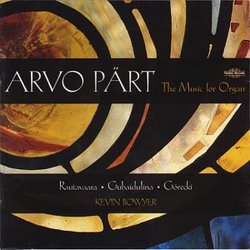| All Artists: Rautavaara, Gubaidulina, Gorecki, organ Kevin Bowyer, Part Title: Arvo Part-Music for Organ Members Wishing: 0 Total Copies: 0 Label: Nimbus Records Release Date: 7/10/2001 Genre: Classical Styles: Opera & Classical Vocal, Chamber Music, Historical Periods, Classical (c.1770-1830) Number of Discs: 1 SwapaCD Credits: 1 UPC: 710357567520 |
Search - Rautavaara, Gubaidulina, Gorecki :: Arvo Part-Music for Organ
 | Rautavaara, Gubaidulina, Gorecki Arvo Part-Music for Organ Genre: Classical
|
Larger Image |
CD Details |
CD ReviewsContemporary music and the organ Mark Swinton | 10/04/2001 (3 out of 5 stars) "Possibly no other living organist has shown as much devotion to twentieth century music as Kevin Bowyer. This disc, including the complete works for organ to date by Arvo Part, is surely one of the best examples of his unique gift for handling the most demanding of contemporary music - including that by virtually unheard-of composers - and making it sound brilliant.As one of the most popular of contemporary composers, Arvo Part should need little introduction. Though his output for organ can be counted on the fingers of just one hand, it is every bit as characteristic as the celebrated vocal and instrumental works, and shows a most admirable understanding of the instrument. Christopher Bowers-Broadbent (in the liner notes) describes "Pari intervallo" as Part's most beautiful composition; it is certainly one of his most approachable for players and listeners and on this recording Bowyer imbues it with a quality that captures its 'distant' effect whilst being clearly focussed and appropriately sombre in mood. The other widely celebrated Part work in the programme is "Annum per annum," with its famous (some might say notorious!) introduction in which the organist must switch the motor off and allow the massive opening chord to die away quite literally... This piece is framed around the movements of the Mass (each section is entitled with an initial from the movements of the Mass Ordinary) and is a masterpiece of colour and graded timbre, with an uplifting transition from the minor key to the major key halfway through. It requires nimble playing: Bowyer gets it absolutely spot on. "Mein Weg hat Gipfel und Wellentaler" and "Trivium" are perhaps less well known. The former is a sort of toccata: it is written in three 'layers' corresponding to those of the organ console (ie. right hand on one keyboard, left hand on another keyboard and feet on the pedalboard) and one of these layers is always fast and extremely busy. The effect of this piece is kaleidoscopic (it has sometimes been said that listening to Part's music is like looking into a prism or a kaleidoscope) and it provides the player with no small test of stamina. "Trivium" is more sedate: a plainchant-like melody, unmistakably harmonised by the composer, and set in a three-fold sectional work with, again, an ever-shifting landscape of sonic colour. Both works are beautifully and captivatingly played.The composers chosen to flesh out this programme are vastly different to Arvo Part, but complement him very well. Einojuhani Rautavaara, possibly the most successful Finnish composer since Sibelius, is represented by three impressive works. His "Toccata" is a far cry from the favourites of Widor, Dubois, Gigout and the great French Romantics: it is an utterance as bold and brash as anything modern music has come up with; very difficult to play but rewarding to hear if you can stomach the intensely fierce dissonances. "Ta Tou Theou" is even harder to swallow: it is a four-movement meditation on spiritual themes in which Rautavaara's use of serialism is strongly demonstrated. Serial music doesn't always work on the organ, and I have to confess that I don't believe this is a particularly successful piece. The same cannot be said for "Laudatio Trinitatis": this is a very recent work showing Rautavaara at his best, with rich chordal writing and lush soundscapes, made all the more effective for being crafted on the unique tonal palatte of the organ. Rautavaara has spoken frequently of his interest in religious ideas: his organ music, like Part's, speaks of an unshakeable faith in something beyond this world, moreover something far more powerful than mortal mankind...The name of Henryk Gorecki is often found in tandem with that of Arvo Part; his "Kantata" is a very dissonant construction, although its musical building-blocks are surprisingly simple. More complex, but much lighter and more internally varied, is "Hell und Dunkel" by the Eastern composer Sofia Gubaidulina. Here is music that has until now had no audience in these parts of the world (at least, not here in the UK) - admittedly, music of this sort attracts a very select group of listeners, but it is not all bluster: some of it is startlingly beautiful.All this makes for what I like to call a "recherche" programme; this disc is music for the concert hall, and amongst organists I can imagine only established concert organists (of whom there are not as many as church organists) having any interest in taking up Kevin Bowyer's lead. For listeners, too, the experience will either be intriguing or much too overwhelming. It has to be said, however, that Bowyer's excellent performances bode very well for keeping the organ in the eye of the concert-going public."
|

 Track Listings (20) - Disc #1
Track Listings (20) - Disc #1